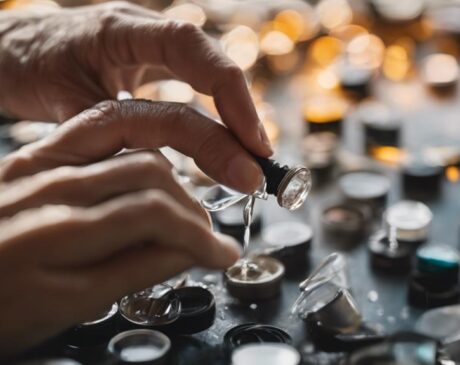What Does Salt Do to Your Nails?
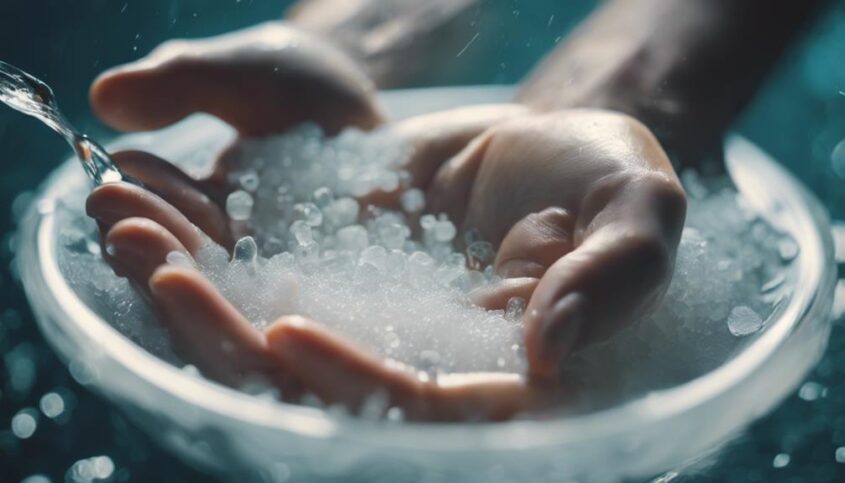
Salt dehydrates nails, causing brittleness, dryness, and breakage. Nail hydration is crucial for strength and health. Regular moisturizing and protection are key for nail care. Innovative treatments with hydrating ingredients can restore moisture balance and fortify against environmental stressors. Additionally, salt exposure can lead to nail discoloration, making nails yellowish or brownish. Preventive measures like wearing gloves and moisturizing regularly can help combat salt-induced damage. To safeguard nails, use protective gloves, limit soaking in saline solutions, and apply nail strengtheners enriched with vitamins and minerals. Taking proactive nail care measures is essential in protecting against salt effects.
Key Takeaways
- Salt dehydrates nails, leading to brittleness and breakage.
- Dehydration causes nail weakness and splitting.
- Prolonged salt exposure can cause nail discoloration.
- Salt strips natural oils, making nails brittle.
- Protect nails with gloves, moisturize regularly, and limit salt exposure.
Effects of Salt on Nail Hydration
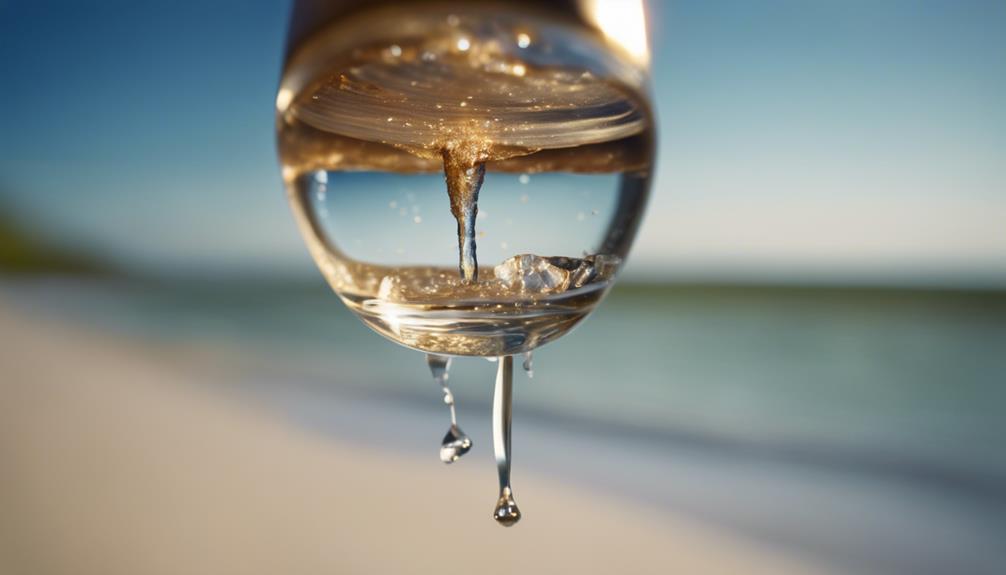
Salt exposure can significantly impact the hydration levels of nails, leading to potential changes in their overall health and appearance. Nails, composed of keratin, are porous structures that can absorb moisture from their surroundings. When exposed to salt, nails may absorb excess salt particles, causing dehydration and weakening of the nail structure. Dehydrated nails are more prone to becoming brittle, dry, and prone to breakage, affecting their appearance and overall health.
Maintaining optimal nail hydration is essential for promoting nail health and strength. Hydrated nails are more flexible and less likely to break or split. To counteract the effects of salt exposure, it is crucial to moisturize nails regularly using nourishing oils or creams. Additionally, protecting nails by wearing gloves when engaging in activities involving salt exposure can help prevent dehydration and maintain nail hydration levels.
Innovative solutions such as nail hydration treatments enriched with hydrating ingredients like hyaluronic acid or ceramides can help restore moisture balance to salt-exposed nails, promoting healthier and more resilient nails. By understanding the impact of salt on nail hydration, individuals can take proactive steps to maintain the health and appearance of their nails.
Salts Impact on Nail Strength
Exposure to salt can have a notable influence on the structural integrity and resilience of nails. Salt, particularly sodium chloride, can lead to decreased nail strength and increased brittleness. When nails come into contact with saltwater or salty environments frequently, they can become dehydrated, causing them to lose their natural flexibility and strength. This dehydration process can make nails more prone to breakage, chipping, and splitting.
The impact of salt on nail strength is attributed to its ability to draw moisture out of the nails, leaving them dry and weakened. Additionally, the abrasive nature of salt particles can wear down the surface of the nails, further compromising their strength. To combat the negative effects of salt on nail strength, it is essential to moisturize regularly and protect nails from prolonged exposure to salty substances.
Innovations in nail care products have led to the development of specialized treatments that aim to strengthen and fortify nails against environmental stressors like salt. These products often contain hydrating ingredients and protective coatings to help maintain nail strength and integrity in the face of salt-induced damage.
Nail Discoloration Caused by Salt
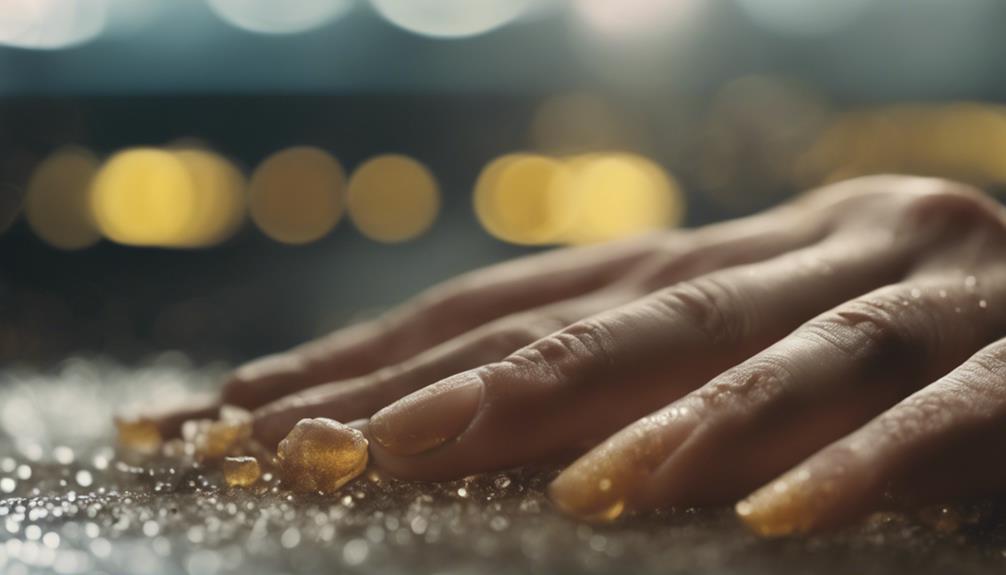
Occasionally, prolonged contact with saline solutions can result in noticeable discoloration of nails. Salt, when in direct contact with nails for extended periods, can lead to a yellowish or brownish tint on the nail surface. This discoloration may be a result of the salt drawing out moisture from the nails, causing dehydration and subsequently altering their appearance. The chemical composition of salt can also react with the keratin in nails, leading to staining and discoloration over time.
Furthermore, the presence of impurities in certain types of salt can exacerbate this discoloration effect. For instance, sea salt or table salt that contains additives may have a more pronounced impact on nail coloration. To prevent or minimize nail discoloration caused by salt, it is advisable to wear gloves when handling salt or engaging in activities that involve prolonged exposure to saline solutions. Additionally, moisturizing the nails regularly can help maintain their health and appearance despite potential contact with salt.
Potential Nail Damage From Salt
Over time, consistent contact with saline solutions may lead to detrimental effects on nail health and integrity. Salt, known for its drying properties, can strip the nails of their natural oils, leaving them brittle and prone to breakage. The dehydrating effect of salt can also cause the nails to become weak and more susceptible to damage.
Moreover, the abrasive nature of salt particles can create small scratches on the nail surface, leading to roughness and uneven texture. These microscopic damages can compromise the nail's strength and make it more prone to splitting and peeling.
In addition, excessive exposure to salt can disrupt the natural pH balance of the nails, making them more vulnerable to infections and fungal growth. This imbalance can weaken the nail structure, making it difficult for the nails to maintain their health and appearance.
To safeguard against these potential damages, it is crucial to limit exposure to salt and ensure proper nail care practices to maintain optimal nail health and integrity.
How to Safeguard Nails From Salt
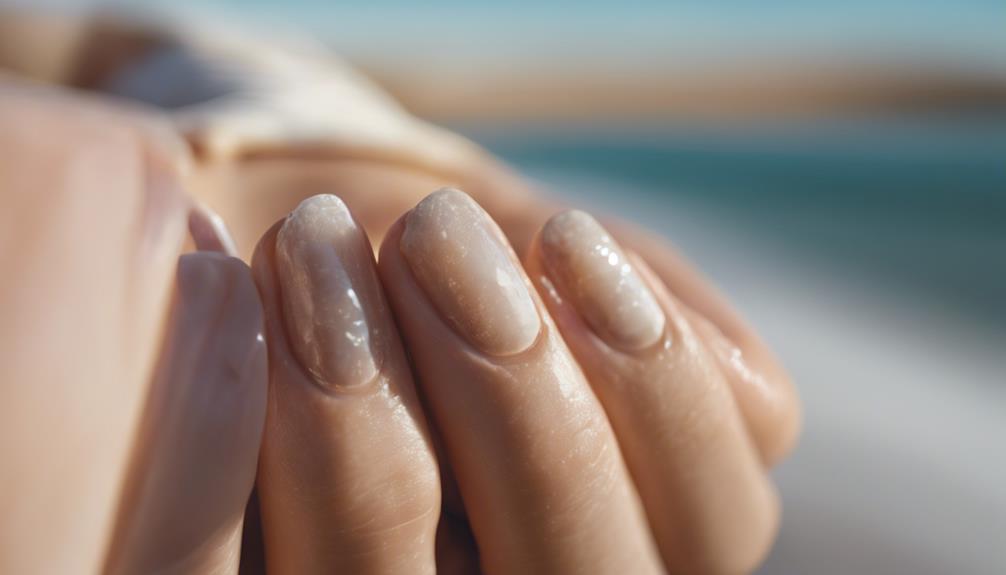
To protect your nails from the potential damaging effects of salt, it is important to establish a proactive nail care routine that includes measures to counteract the adverse impact of saline solutions. One innovative approach is to incorporate the following strategies into your nail care regimen:
| Protective Measure | Description | Benefits |
|---|---|---|
| Use Protective Gloves | Wear gloves while working with salt or salty solutions to prevent direct contact and minimize absorption. | Shields nails from direct salt exposure. |
| Moisturize Regularly | Apply a rich moisturizer to nails and cuticles to maintain hydration levels and prevent salt-induced dryness. | Helps combat the drying effects of salt. |
| Limit Submersion Time | Avoid prolonged exposure of nails to saltwater by limiting soaking time in saline solutions. | Reduces the duration of nail exposure to salt. |
| Apply Nail Strengtheners | Use nail strengtheners enriched with vitamins and minerals to fortify nails and protect them from salt-induced weakness. | Strengthens nails against potential salt damage. |
Frequently Asked Questions
Can Using Salt on Nails Help to Prevent Nail Fungus?
Using salt on nails as a preventive measure against nail fungus is a common practice. Salt's antibacterial and antifungal properties may help inhibit fungal growth. However, consulting a healthcare professional for an accurate diagnosis and treatment plan is recommended.
Does Salt Water Have Different Effects on Nails Compared to Table Salt?
Saltwater and table salt can have varying effects on nails. While saltwater exposure can lead to dehydration and weakening of nails due to prolonged exposure, direct application of table salt may act more aggressively, potentially causing damage.
Will Soaking Nails in Salt Water Make Them More Brittle?
Soaking nails in salt water may potentially lead to increased brittleness due to the dehydrating effects of salt. This can weaken the nails over time. It is advisable to limit exposure and moisturize adequately.
How Long Does It Take for Salt to Cause Damage to Nails?
The duration for salt to cause nail damage varies depending on exposure and nail health. While a hyperbole, in extreme cases, prolonged exposure to salty environments can expedite damage. Constant care and hydration are crucial.
Are There Any Benefits to Using Salt Scrubs on Nails?
Salt scrubs can offer benefits to nails by exfoliating dead skin cells, promoting circulation, and improving overall nail health. The abrasive nature of salt helps to remove impurities and soften cuticles, resulting in healthier nails.

